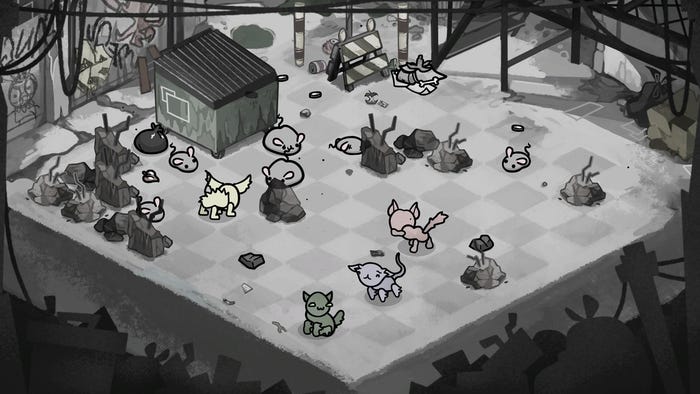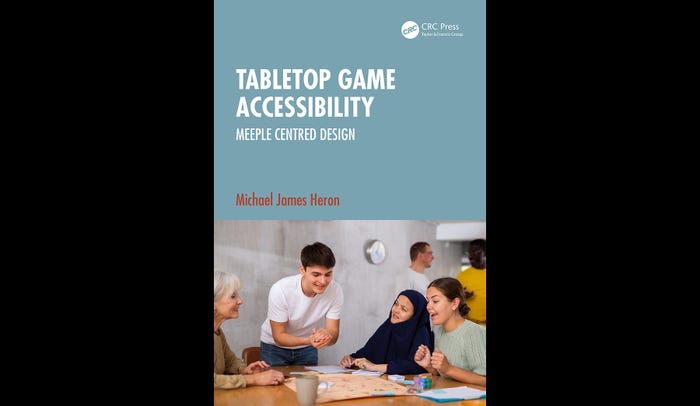Gamasutra's Best of 2016: The top 10 game developers of the year
As the holidays approach, it's once again time for our annual picks for Gamasutra's top 10 developers of the year. Nailing down the list of selections was as tough as ever.

It's once again time for Gamasutra's end of year roundups, starting with perhaps our most important annual list: The Top 10 Game Developers of 2016.
This was a year that saw three eagerly anticipated games finally launch after a decade of development. We saw new talents emerging out of nowhere, established studios completely remaking themselves, and venerable veteran developers reminding us why they're still on top.
Assembling this list involved a great deal of debate among our staff, as it does every year. We make a point of noting that recognition on this list isn't necessarily just about who made a good game in 2016, although that does help. These are the developers and studios that left their mark on this year in a meaningful way, shaping the year in the art and business of making games.
Below (in alphabetical order) are the 10 individual developers and studios, selected by Gamasutra's writers, that exceeded our expectations and pushed creative, commercial, and cultural boundaries.
Blizzard Entertainment
 Last year, we praised Blizzard for surviving and thriving amid massive sea-changes in the industry, and 2016 only continues that trend for the company.
Last year, we praised Blizzard for surviving and thriving amid massive sea-changes in the industry, and 2016 only continues that trend for the company.
The rollout of Overwatch has so far been one of the company’s most successful commercial endeavors, launching the game industry giant into a new genre and successfully locking down most of the audience for the “hero shooter” genre.
But that’s not all the company’s been up to. After enduring a wave of criticism for the World of Warcraft expansion Warlords of Draenor, Blizzard made changes to its production model to successfully turn around its latest expansion Legion in a record amount of time, shortening the years-long gap between expansions to a single year. Given that Blizzard has been attempting this since the days of The Burning Crusade, the company’s ability to drastically respond to changing market forces needs to be commended, even when it’s in a genre they won long ago.
But lastly, Blizzard deserves extra praise for creating more diverse characters in its games and responding to the desires of its playerbase. While you could point to Overwatch’s diverse cast as proof enough of this effort, the fact that the company emphasized these values at The Game Awards this year stands as a shining example for representation the game industry, and how it can serve a global audience at the highest tiers of commercial success.
Concerned Ape (Eric Barone)

Eric Barone set out to create a game that was both an ode to Harvest Moon and also addressed some of the problems he found in the recent games of that series.
Instead, he ended up single-handedly developing something that breathed new life into a genre that had mostly been dominated by Harvest Moon since the '90s. Barone’s game, Stardew Valley, quickly found success after its launch earlier this year and managed to sell over a million copies in just two short months.
What makes Barone’s accomplishment with Stardew Valley especially notable is the fact that he developed the game entirely on his own. Every inch of the game - the code, art, story, music - was carefully crafted by Barone across Stardew Valley’s four-year development.
To accomplish this, he’s been operating in a state of pure crunch since announcing the project on Steam Greenlight in 2014. Before launch, Barone said he worked on Stardew Valley for 10 hours every day. Now that his game is out in the wild that number has jumped to 15 as he works on bringing Stardew Valley to more platforms and creating new features for the more than 1 million players that have fallen in love with his idyllic and captivating game.
D-Pad Studio
One of the trends we observed in 2016 was how a few studios finally shipped games after a decade in development. Among these developers is D-Pad Studio, which deserves special praise for finally bringing the charming platformer Owlboy to the world.
Owlboy, in its creators’ own words, is a game that’s better judged by older games than the cutting edge of today, but the level of polish, craft, and interaction that’s present in this game would be considered stunning for any game studio. The fact that it was in the oven for 10 years, while some of its developers worked in flower shops and held down contract jobs? That’s nearly unthinkable.
It’s no accident that Owlboy’s story is about perseverance and pluck in the face of impossible odds—that it’s able to sell that story after surviving 10 years of gameplay is an astonishing and inspiring feat. Over the past decade, D-Pad exhibited something beyond the abstract idea of "passion" for a project; the studio showed a mastery of art and craft -- along with a heavy dose of commitment -- that is an inspiration to anyone working in a creative field.
GenDesign
 First things first -- many teams at Sony pitched in to make the uniquely beautiful and affecting The Last Guardian over the course of its lengthy development cycle. But the finished product bears the unmistakable imprint of the people at GenDesign, a studio created by Fumito Ueda and some of the core team members who previously worked with him to create Ico and Shadow of the Colossus.
First things first -- many teams at Sony pitched in to make the uniquely beautiful and affecting The Last Guardian over the course of its lengthy development cycle. But the finished product bears the unmistakable imprint of the people at GenDesign, a studio created by Fumito Ueda and some of the core team members who previously worked with him to create Ico and Shadow of the Colossus.
Every single person who worked on making this ambitious game a reality should take immense pride in the result. But it’s the team at GenDesign who get our nod for creating a worthy successor to two of the most celebrated games in the history of the medium.
The Last Guardian is a continuation of the main theme of Ueda's previous games: exploring the bond between the player and a companion that they alternately rely upon and protect. This year, GenDesign inspired not only players, but also game developers, reminding once again that something as technical as game development can bring forth a work of art that reflects our innate, emotional tendencies as human beings.
Hello Games
 Hello Games earned its place on this list for a couple of reasons. For one, No Man’s Sky was –
Hello Games earned its place on this list for a couple of reasons. For one, No Man’s Sky was –
and remains – an ambitious project, particularly for the small independent team at Hello Games, whose previous games were a couple of fun, arcade motocross affairs.
Procedural generation in video games has been a hot topic, particularly in the last few years, and we’ve seen great examples of it. But Hello Games took that concept and created an experience that will be remembered as an inflection point for procedural generation, showing how the technique can be used to create countless visually emotive, living worlds and inhabitants.
The other reason Hello makes it on our list is because of its perseverance in the face of adversity. As has been well-documented, the launch of No Man’s Sky was tumultuous to say the least. Hello Games and individuals within the studio have received online abuse and death threats, all of which, no matter your opinion on the game’s marketing, are inexcusable and indicative of some deep-seated problems in the relationship players have with developers.
Instead of letting these sizable challenges defeat it, Hello instead listened to legitimate criticisms, put its nose to the grindstone, and recently released the expansive “Foundation Update,” which, along with smaller, frequent updates, has since helped nudge the conversation around No Man’s Sky to be about actually playing and enjoying No Man’s Sky.
On one hand, Hello Games in 2016 was a terrifying case study of what could happen when a portion of a fanbase turns into a mob; the situation has really spooked some game developers, particularly small ones like Hello. On the other hand, Hello's year is inspiring, because if this small studio with big ambitions could at least begin to turn such a difficult situation around, then maybe other developers can persevere too.
id Software
 In the beginning, there were video games. Many were good, and in their wake came countless sequels, spin-offs and franchises.
In the beginning, there were video games. Many were good, and in their wake came countless sequels, spin-offs and franchises.
Now, decades into the game industry’s lifespan, we’re knee-deep in remakes, remasters and reimaginings of older games, many of which fail to capture or improve upon what made the original work significant.
That’s not true of Doom, which id Software released this year to remarkable critical acclaim. Players, critics, and fellow developers praised the game (id’s first new release in half a decade) as a surprising return to form, one that breathed new life into the first-person shooter genre. It reminded us why the original Doom was so arresting, so influential, that for a time FPS games were known simply as “Doom clones.��”
It’s no mean feat to create a genre-defining game. It’s arguably even harder to look back on such a work 20+ years later, accurately assess what makes it great, and use those elements as a foundation to build something new. This year id accomplished just that, and for that we recognize the studio as one our top developers of the year.
IO Interactive
 Hitman is the franchise that Copenhagen-based IO Interactive is known for. So messing with that winning formula is a risky endeavor.
Hitman is the franchise that Copenhagen-based IO Interactive is known for. So messing with that winning formula is a risky endeavor.
But sometimes change is required in order for even a popular series to remain viable. This year, IO announced that the next main installment in the Hitman franchise would be released episodically – one driving factor being the increased margins of purely digital releases when compared to disc-based traditional releases.
The decision had to be sold hard internally: shareholders, the development team, publishing teams, sales, marketing, and other parties all needed to be convinced. And then once that battle was won, an even bigger challenge awaited, as the fans had to be won over and convinced that this major shift wasn’t going to ruin their favorite franchise.
The transition wasn’t without its challenges. But the studio eventually learned how to effectively communicate a complicated business model to its audience, learned a greater understanding of accountability, and in the end created a new, market-proven variation of the episodic business model. That’s an accomplishment that may well reach beyond the walls of IO Interactive, and influence other studios that need to remain competitive – and maintain their existing fanbases – in an unforgiving market.
Niantic Labs
 A popular game alone isn’t necessarily enough to land a developer on this list, but Niantic certainly deserves to be recognized for creating something that rapidly become a cultural phenomenon.
A popular game alone isn’t necessarily enough to land a developer on this list, but Niantic certainly deserves to be recognized for creating something that rapidly become a cultural phenomenon.
When the augmented reality game Pokemon Go launched this past summer, servers struggled to keep up with traffic that was nearly 50 times greater than the developer’s pre-launch predictions. Even so, the 70-person development team was able to weather the storm to create one of the stand-out social game experiences of recent time.
Niantic was able to create a game with this level of success by leveraging both the inherent popularity of the Pokemon brand and past experiences with their previous location-based game Ingress.
The gyms and Pokestops of Pokemon Go were largely built on crowdsourced landmark information provided by Ingress players since that game launched in 2012. It’s doubtful Pokemon Go would have done as well as it has without both the lessons learned and the resources Niantic gained through Ingress.
Pokemon Go could’ve easily been a one-and-done game that fizzled out shortly after launch, but the decisions made by Niantic in development, during launch, and following release ensured that it instead became a cultural icon that is as much a social experience as it is a video game.
Owlchemy Labs

As virtual reality continued to be one of the most talked about trends in 2016, Owlchemy Labs and its efforts in the VR space need to be recognized. This small studio out of Austin, Texas has proven to be a forerunner in the field of interactivity in VR, as exhibited by its game Job Simulator.
Don’t be fooled by its cartoony graphics and general absurdity: Job Simulator is absolutely the most intuitive room-scale VR game with the best affordance design on the market right now. That's all due to Owlchemy's world-class approach to design and development in a new generation of VR.
The studio is also keenly aware of the challenges facing the VR market, perhaps most notably the difficulty of showing people who aren’t in VR what it’s like to be in a VR game. Owlchemy recently showed off an advanced (i.e. mind-blowing) mixed reality method dubbed “depth-based realtime in-app mixed reality compositing.” Still in development, the fancily-named technique could have a huge impact on the effectiveness of VR marketing.
Owlchemy also seems to know that a rising tide lifts all boats, as the studio shares its own lessons learned, and is an active member within the VR development community. It's an important attitude to adopt, as VR is still a fledging space that needs to continuously advance if it’s to become more than just a flash in the pan.
Witching Hour Studios
 Our own Katherine Cross praised Witching Hour Studios earlier this year for boldly stepping onto the world stage with a unique Singaporean style, but we wanted to celebrate the Southeast Asian developer for a variety of reasons. For one, its debut Masquerada: Songs and Shadows proved to be a thoughtful and engaging role-playing game that deftly mixed social issues with typical RPG design.
Our own Katherine Cross praised Witching Hour Studios earlier this year for boldly stepping onto the world stage with a unique Singaporean style, but we wanted to celebrate the Southeast Asian developer for a variety of reasons. For one, its debut Masquerada: Songs and Shadows proved to be a thoughtful and engaging role-playing game that deftly mixed social issues with typical RPG design.
For another, they’re the only developer on this list that had to go toe-to-toe with its own government to ensure it could bring a gay character to life in their game.
As we reported back in 2015, Witching Hour Studios first skirted the government’s laws about depictions of gay characters in media mostly via brief encounters at shared events. But as we discussed with creative director Ian Gregory, this evolved into a conversation with the government about the role media plays in Singaporean culture, and how gay characters should be depicted in games like Masquerada.
In the U.S., we recognize domestic game companies that understand the importance of workplace diversity (e.g. Electronic Arts was just named the most LGBTQ-friendly workplace in America). But it's also important to recognize the effort of a smaller studio overseas that's grappling with a humanitarian issue while shipping a noteworty RPG.
Hungry for more 2016 best-of? Gamasutra published our picks for the Top 10 Games of 2016, Top 5 Trends of 2016 and Top 5 Events that shaped the year. Gamasutra contributors also each wrote up a personal top-five list -- and you can read them here: Kris Graft, Alex Wawro, Bryant Francis, Katherine Cross, Chris Baker, Alissa McAloon, Chris Kerr, Phill Cameron, and Brandon Sheffield.
About the Author(s)
You May Also Like









.png?width=300&auto=webp&quality=80&disable=upscale)



